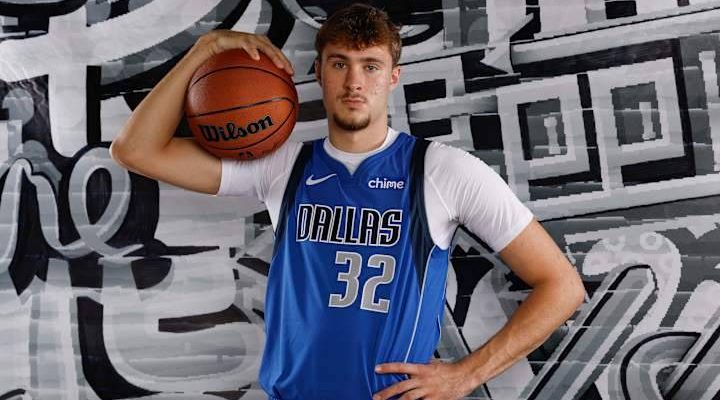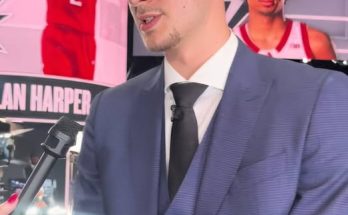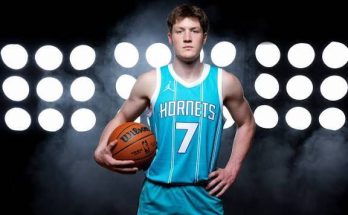The world of basketball is constantly searching for its next generational star, the kind of player who transcends box scores and highlights, the one who blends raw talent with an unwavering competitive drive that separates good from great. For many, Luka Dončić has been the modern definition of that archetype: a player whose skill, vision, and unshakable mentality have made him one of the NBA’s brightest icons before even reaching his prime. But in 2025, a new name has been commanding attention for carrying that same type of aura, confidence, and relentless approach: Cooper Flagg. From his days at Duke to his rising career in Dallas, Flagg has embodied the mindset that makes winners, not just scorers. And if there’s one lesson the basketball world has learned from his trajectory, it’s that Duke doesn’t just produce NBA players—it builds competitors who thrive under the heaviest spotlights.
Cooper Flagg’s story has always been about more than talent. Talent, after all, was obvious from the time he was in middle school, where highlight tapes showed him dunking on older players, swatting shots into the bleachers, and draining threes with effortless confidence. Scouts knew his skill was elite, but what set him apart was his approach. Much like Luka, Flagg carried himself as though the game slowed down for him, as though every moment was another puzzle to solve, another angle to exploit. That cerebral quality, combined with his fiery competitiveness, became the backbone of his career before it even began.
When Flagg committed to Duke, fans expected fireworks. The Blue Devils have always been a proving ground for top-tier recruits, but what Flagg brought was a refreshing blend of humility and hunger. He didn’t arrive in Durham to be a celebrity; he came to be sharpened, tested, and challenged. From the first practice, reports swirled about how he wasn’t afraid to bark at teammates, demand accountability, or dive for a loose ball when the cameras weren’t around. That Luka-like mindset—that mix of confidence without arrogance, swagger without showboating—made teammates respect him instantly.
At Duke, the numbers told part of the story. Flagg filled the stat sheet with his versatile scoring, rebounding, and playmaking, but the more important piece was the culture shift he sparked. Duke has always been about winning, but Flagg reignited the gritty, competitive edge that made them feared. His leadership went beyond the huddle; it seeped into the way the team trained, how they responded to losses, and how they performed in must-win moments. In March Madness, it wasn’t just his game-winning shots that caught national headlines, but the way he demanded the ball, steadied his teammates, and attacked every possession with the belief that he could—and would—control the outcome.
That mindset carried him straight into the NBA Draft, where Dallas took a chance on him not just for his skill, but for his mentality. And the fit could not have been more poetic: a young star with Luka Dončić’s approach joining the very team that made Luka a household name. It didn’t take long for comparisons to pour in, but instead of being overwhelmed by the weight of expectations, Flagg leaned into them. He acknowledged Luka’s greatness, praised him as an inspiration, and then calmly declared that he wanted to bring the same type of winning mentality to Dallas.
From day one in Dallas, the similarities were clear. Luka’s gift has always been seeing the floor like a chessboard, processing plays two steps ahead, and refusing to let pressure alter his poise. Flagg, though not identical in style, carries that same basketball IQ. He plays with rhythm and patience, dissecting defenses instead of forcing shots. When Dallas needed a bucket in clutch moments, he didn’t shy away—he demanded the ball. And when they lost, he didn’t point fingers—he took responsibility. That mindset, the refusal to make excuses, is why coaches rave about him and fans already adore him.
But this story isn’t just about one player’s rise. It’s about the program that molded him. Duke has a long history of producing stars who embody more than highlight reels. From Grant Hill to Kyrie Irving, Jayson Tatum to Zion Williamson, Duke’s culture has consistently churned out players who enter the NBA ready for the spotlight. Cooper Flagg’s transition from college to pros underscores the truth that Duke doesn’t just develop basketball skills; it instills a mentality of accountability, leadership, and resilience.
Flagg himself has spoken often about how Duke shaped him. He credits the coaching staff for instilling discipline, for demanding not just talent but effort on every possession. He’s said repeatedly that the practices at Duke felt harder than some games, and that culture of relentless improvement toughened him for the NBA grind. More than that, he praises the tradition of Duke players who came before him, the legacy of those who carried themselves as competitors first and celebrities second. That history, that identity, is what he brought with him to Dallas.
The Luka comparison, of course, isn’t about style of play. Luka is a point-forward maestro who thrives with the ball in his hands, while Flagg is a versatile forward who can dominate on both ends. But what connects them is deeper: a mentality that refuses to be rattled, a competitive fire that burns brightest when the game is hardest, and a confidence that doesn’t come from hype but from preparation. Both players share that rare quality of looking at pressure and seeing opportunity.
Dallas, a city hungry for championships, has quickly embraced Flagg not as Luka’s shadow but as Luka’s spiritual successor. The fans see in him the same refusal to wilt, the same ability to carry a team when it matters most. And in a league where young stars often take years to adjust to the pressure, Flagg’s immediate poise has been nothing short of remarkable.
Critics may argue it’s too early to crown him, that one strong rookie campaign doesn’t cement a legacy. But those who’ve followed his journey know better. They’ve seen the hours in the gym, the fire in his eyes during postgame interviews, the way he refuses to coast on talent alone. They know that this isn’t about hype; it’s about mindset. It’s about the rare type of competitor who views every setback as fuel, every challenge as a chance to prove himself.



